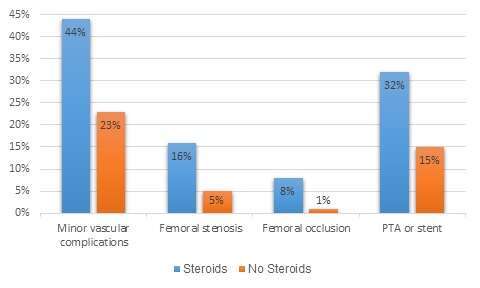Objectives: To assess the rate of vascular complications in steroid treated patients undergoing trans-femoral aortic valve implantation (TAVI).
Background: Steroid therapy has been associated with increased post-surgical bleeding. Vascular complications are a major concern in patients undergoing trans-femoral TAVI, however the effect of corticosteroids on vascular complications has not been assessed in these patients.
Methods: We conducted a retrospective analysis of 220 consecutive patients undergoing trans-femoral TAVI at our institute between the years 2009-2013. Patients who were on steroids at the time of the procedure (n=25) were compared to those that were not (n=195).
Results: Baseline characteristics between groups were similar except for greater incidence of chronic renal failure (52% vs. 25%, p=0.05) and lower left ventricular ejection fraction (50.3% vs. 55.8%, p=0.037) in the steroid group. The rate of procedural success and non-vascular complication was similar in both groups with the exception of more temporary AV block in the steroid group (24% vs. 8%, p=0.016). Patients treated with steroids had significantly more minor vascular complication (44% vs. 23%, p=0.024), and significantly more femoral artery stenosis (16% vs. 5%, p=0.036), occlusion (8% vs. 1%, p=0.014), need for femoral artery percutaneous transluminal angioplasty (PTA) (32% vs. 12%, p=0.009), and femoral artery PTA or stenting (32% vs. 15%, p=0.031). On multivariate analysis steroid treatment was the only predictor of minor vascular complications (RR=2.52, 95% CI 1.02-6.24, p=0.045).
Conclusions: Concurrent corticosteroid treatment is associated with a higher rate of minor vascular complication following trans-femoral TAVI. Operators should be aware of this risk when assessing patients for the procedure.


